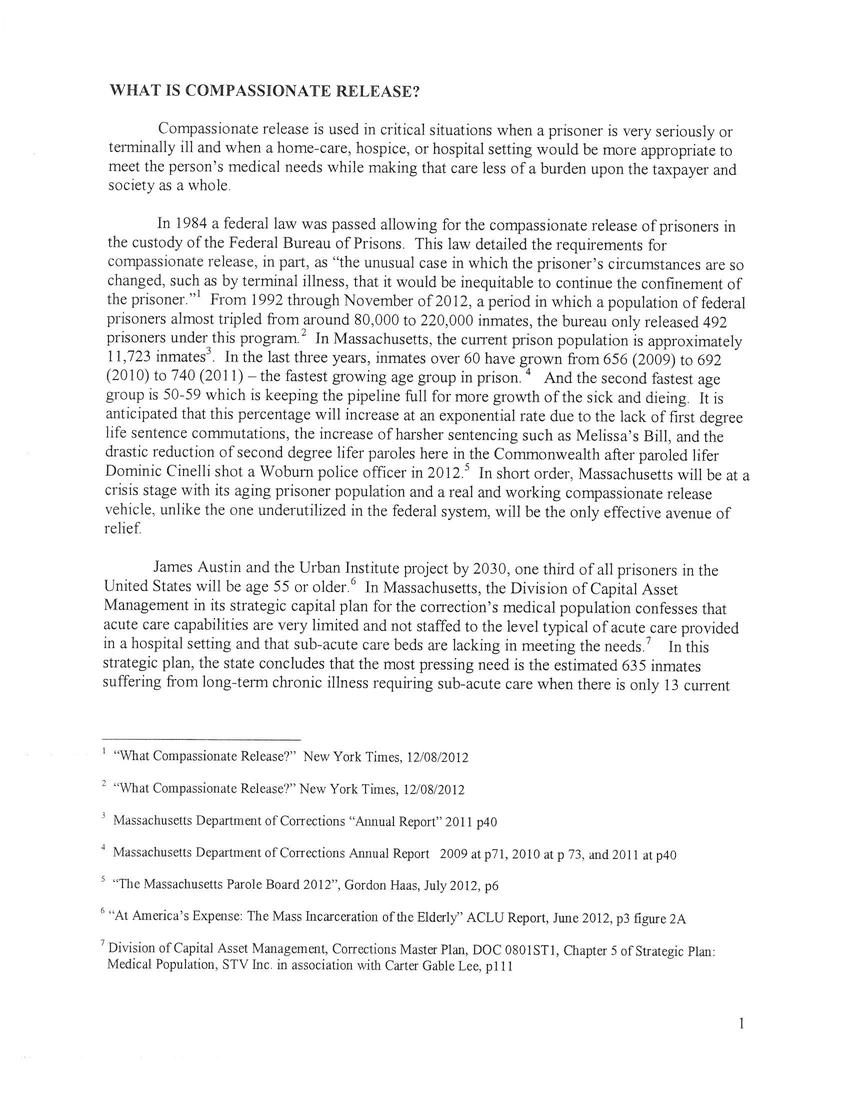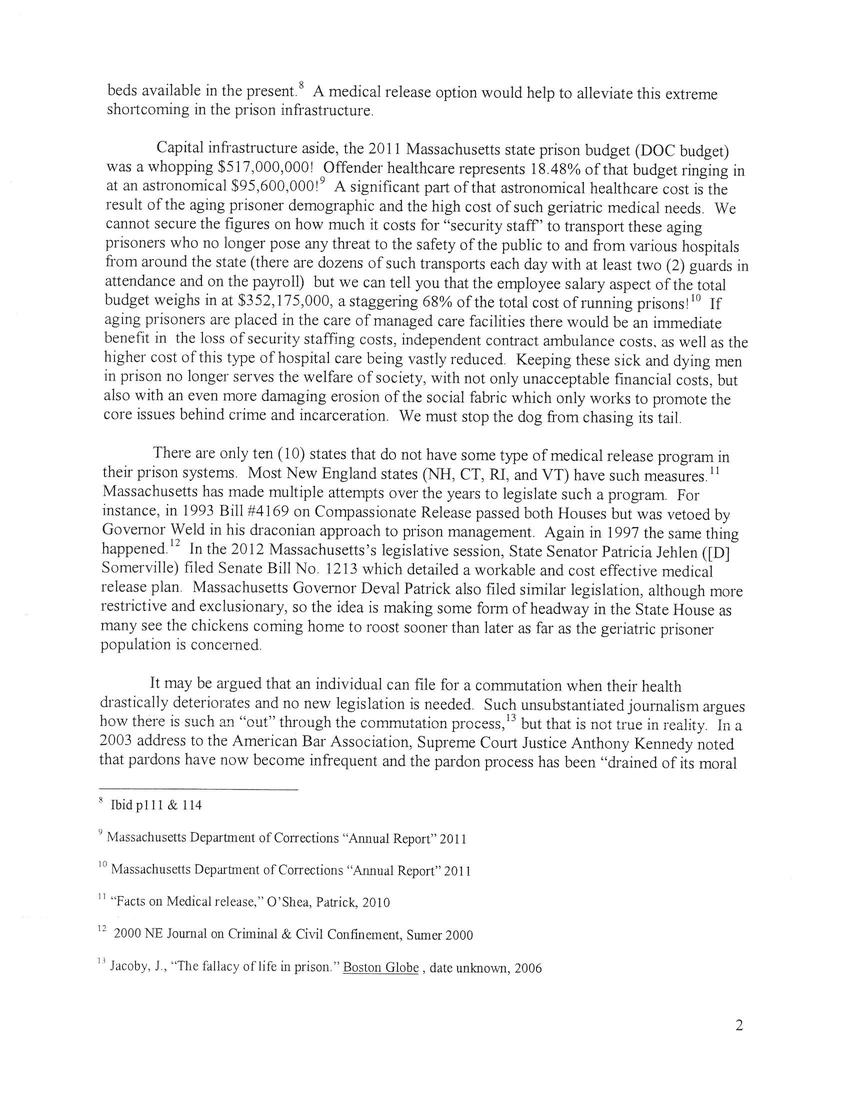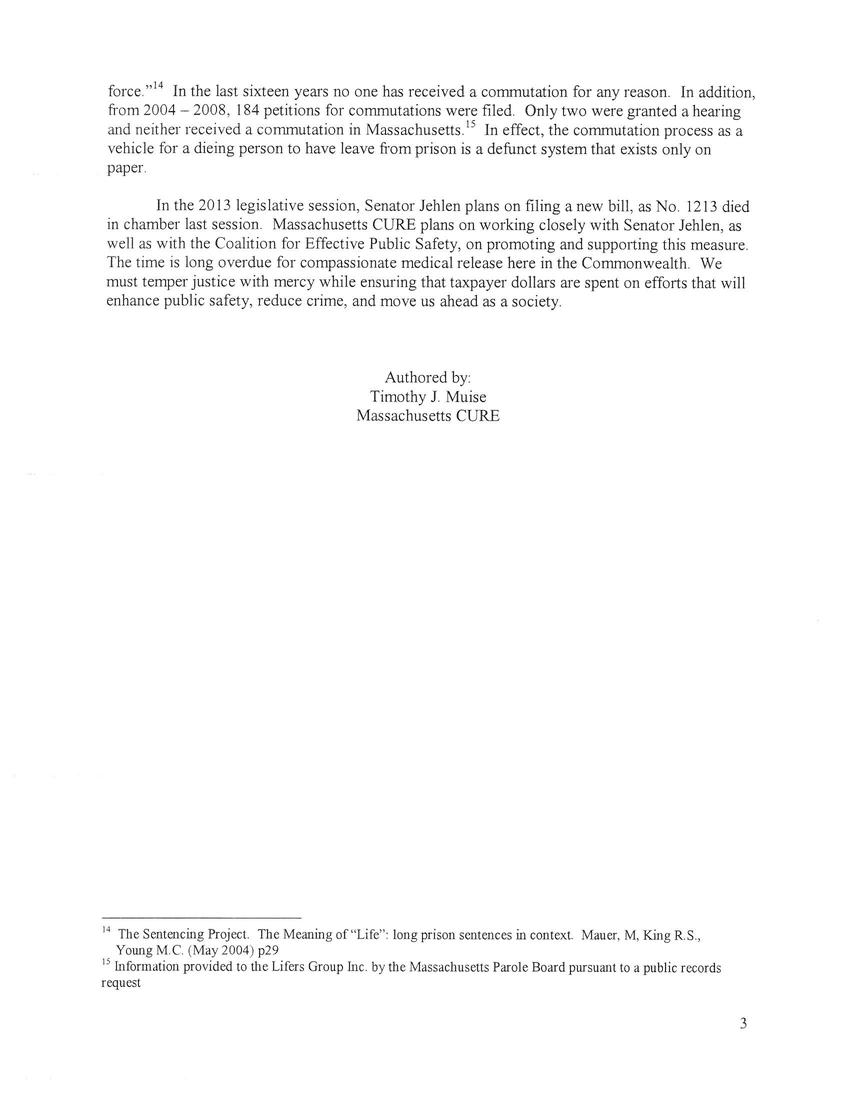
Transcription
WHAT IS COMPASSIONATE RELEASE?
Compassionate release is used in critical situations when a prisoner is very seriously or terminally ill and when a home-care, hospice, or hospital setting would be more appropriate to meet the person's medical needs while making that care less of a burden upon the taxpayer and society as a whole.
In 1984 a federal law was passed allowing for the compassionate release of prisoners in the custody of the Federal Bureau of Prisons. This law detailed the requirements for compassionate release, in part, as "the unusual case in which the prisoner's circumstances are so changed, such as by terminal illness, that it would be inequitable to continue the confinement of the prison." From 1992 through November of 2012, a period in which a population of federal prisoners almost tripled from around 80,000 to 220,000 inmates, the bureau only released 492 prisoners under this program. In Massachusetts, the current prison population is approximately 11,723 inmates. In the last three years, inmates over 60 have grown from 656 (2009) to 692 (2010) to 740 (2011) - the fastest growing age group in prison. And the second fastest age group is 50-59 which is keeping the pipeline full for more growth of the sick and dying. It is anticipated that this percentage will increase at an exponential rate due to the lack of first degree life sentence commutations, the increase of harsher sentencing such as Melissa's Bill, and the drastic reduction of second degree lifer paroles here in the Commonwealth after paroled lifer Dominic Cinelli shot a Woburn police officer in 2012. In short order, Massachusetts will be at a crisis stage with its aging prisoner population and a real and working compassionate release vehicle, unlike the one underutilized in the federal system, will be the only effective avenue of relief.
James Austin and the Urban Institute project by 2030, one third of all prisoners in the United States will be age 55 or older. In Massachusetts, the Division of Capital Asset Management in its strategic capital plan for the correction's medical population confesses that acute care capabilities are very limited and not staffed to the level typical of acute care provided in a hospital setting and that sub-acute care beds are lacking in meeting the needs. In this strategic plan, the state concludes that the most pressing need is the estimated 635 inmates suffering from long-term chronic illness requiring sub-acute care when there is only 13 current beds available in the present. A medical release option would help to alleviate this extreme shortcoming in the prison infrastructure.
Capital infrastructure aside, the 2011 Massachusetts state prison budget (DOC budget) was a whopping $517,000,000! Offender healthcare represents 18.48% of that budget ringing in at an astronomical $95,600,000! A significant part of that astronomical healthcare cost is the result of the aging prisoner demographic and the high cost of such geriatric medical needs. We cannot secure the figures on how much it costs for "security staff" to transport these aging prisoners who no longer pose any threat to the safety of the public to and from various hospitals from around the state (there are dozens of such transports each day with at least two (2) guards in attendance and on the payroll) but we can tell you that the employee salary aspect of the total budget weighs in at $352,175,000, a staggering 68% of the total cost of running prisons! If aging prisoners are placed in the care of managed care facilities there would be an immediate benefit in the loss of security staffing costs, independent contract ambulance costs, as well as the higher cost of this type of hospital care being vastly reduced. Keeping these sick and dying men in prison no longer serves the welfare of society, with not only unacceptable financial costs, but also with an even more damaging erosion of the social fabric which only works to promote the core issues behind crime and incarceration. We must stop the dog from chasing its tail.
There are only ten (10) states that do not have some type of medical release program in their prison systems. Most New England states (NH, CT, RI, and VT) have such measures. Massachusetts has made multiple attempts over the years to legislate such a program. For instance, in 1993 Bill #4169 on Compassionate Release passed both Houses but was vetoed by Governor Weld in his draconian approach to prison management. Again in 1997 the same thing happened. In the 2012 Massachusetts legislative session, State Senator Patricia Jehlen ([D] Somerville) filed Senate Bill No. 1213 which detailed a workable and cost effective medical release plan. Massachusetts Governor Deval Patrick also filed similar legislation, although more restrictive and exclusionary, so the idea is making some form of headway in the State House as many see the chickens coming home to roost sooner than later as far as the geriatric prisoner population is concerned.
It may be argued that an individual can file for a commutation when their health drastically deteriorates and no new legislation is needed. Such unsubstantiated journalism argues how there is such an "out" through the commutation process, but that is not true in reality. In a 2003 address to the American Bar Association, Supreme Court Justice Anthony Kennedy noted that pardons have now become infrequent and the pardon process has been "drained of its moral force". In the last sixteen years no one has received a commutation for any reason. In addition, from 2004-2008, 184 petitions for commutations were filed. Only two were granted a hearing and neither received a commutation in Massachusetts. In effect, the commutation process as a vehicle for a dying person to have leave from prison is a defunct system that exists only on paper.
In the 2013 legislative session, Senator Jehlen plans on filing a new bill, as No. 1213 died in chamber last session. Massachusetts CURE plans on working closely with Senator Jehlen, as well as with the Coalition for Effective Public Safety, on promoting and supporting this measure. The time is long overdue for compassionate medical release here in the Commonwealth. We must temper justice with mercy while ensuring that taxpayer dollars are spent on efforts that will enhance public safety, reduce crime, and move us ahead as a society.
Authored by:
Timothy J. Muise
Massachusetts CURE
Other posts by this author
|
2017 jun 24

|
2017 jun 24

|
2017 jun 24

|
2017 jun 24

|
2017 jun 18

|
2017 jun 15

|
More... |




Replies